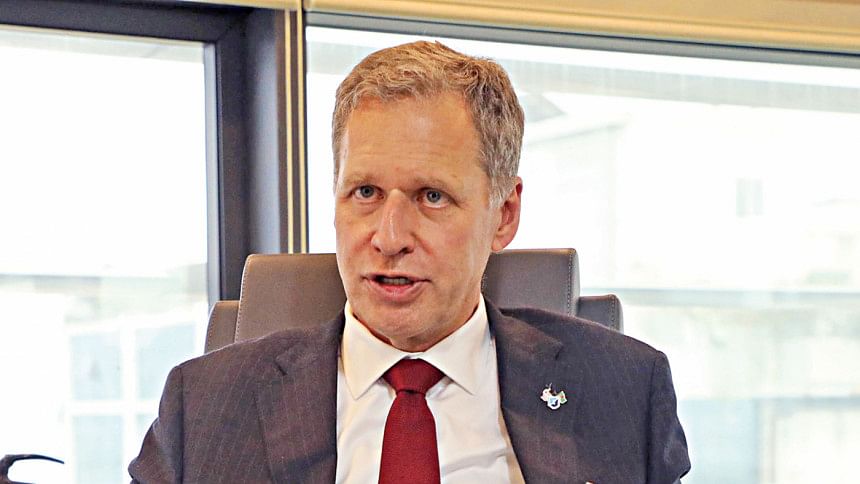Proposed policy reforms conducive to business confidence

The policy reforms being considered in Bangladesh will not only improve its business climate, but also increase foreign investment in the country, according to the top official of Excelerate Energy.
As such, the US-based energy and infrastructure solutions provider is still interested in expanding its local operations even though the interim government recently cancelled one of its major projects.
Since taking office on August 8, the interim government has proposed a slew of measures to improve public administration, the financial sector, public procurement practices and other areas of concern.
"I think these reforms will improve business confidence and foreign investment," Steven Kobos, chief executive officer and president of Excelerate Energy, said in an interview with The Daily Star.
During a four-day visit to Dhaka starting on October 14, he informed Professor Muhammad Yunus, chief adviser to the interim government, and other state officials of his company's views in this regard.
Kobos commended the decision to review all energy projects planned by the previous government as the current administration should be confident about the benefits of these initiatives before implementing them.
He said that as the interim government will reassess the domestic requirement for liquified natural gas (LNG), they provided ideas on how to increase its supply and affordability in the country.
"From our analysis, we believe the country could consume an extra billion cubic feet of LNG each day," he added.
Besides, increasing the supply of LNG would further fuel its demand by boosting industrial activities.
Kobos also informed that the main purpose of his meetings with local government officials was to think collaboratively on how to expand the country's LNG capacity as soon as possible.
The previous government had awarded Excelerate Energy with a project to build a floating storage and regasification unit (FSRU) in Payra of Patuakhali last November.
However, the interim government decided to cancel the agreement earlier this month for failing to follow the proper tendering process.
Kobos, also president of the US-Bangladesh Business Council, said although the contract was still in its primary stage, they had secured a multi-million US dollar commitment from the International Finance Corporation (IFC) for implementing it.
"But I understand that steps are being taken to review agreements in the energy sector that have not been fully executed. So, it is their right [to cancel it] and that is fine," he added.
Still, Kobos conveyed their enthusiasm for further investment as the talent of human resources in the country is as good as anywhere else on Earth.
"We want to invest in Bangladesh if it's the right project. Obviously though, it needs to be something mutually beneficial. We are going to suggest ideas on how that can best be done," he said.
But despite repeated questioning, Kobos refused to confirm whether Excelerate Energy would participate if the interim government floated a fresh tender for another FSRU project.
However, he said they would review the proposals in any such event.
Bangladesh currently has two FSRUs located in Moheshkhali of Cox's Bazar that contribute about one-third of the country's gas supply.
"The existing investments were built on operate and transfer arrangements, meaning they will eventually go to Bangladesh after 15 years of their establishment," he said.
"This means we are transferring knowledge and skills," he added while mentioning that they have around 100 employees in Bangladesh.
Furthermore, Kobos said that one message that kept coming up during his meetings with the advisers of various ministries is that the interim government is trying to improve its transparency and accountability to the people.
"I told the government that I like the progress on transparency and other practices that are going to make this [Bangladesh] a more optimal place to invest in," he added.
Asked about his company's plan to invest in a gas transmission pipeline project in southern Bangladesh, Kobos said they have asked the interim government to consider alternatives as well.
Regarding any other potential plans for the country, he said they are all currently in the concept phase.
"The interim government will need to decide which shortfalls need to be addressed and what routes to take in this regard while considering anticipated changes to domestic production," Kobos added.
Asked about why Excelerate Energy is so eager to invest in Bangladesh, Kobos said most companies generally want to increase their operations in countries where they understand the regulatory regime, how to go about hiring employees and set up offices.
"Once you've done all that, you've done the hardest part of entering a new market. So, in general, we like to do more in markets that we are already in."

 For all latest news, follow The Daily Star's Google News channel.
For all latest news, follow The Daily Star's Google News channel. 



Comments